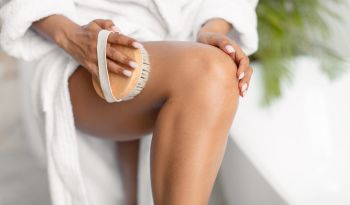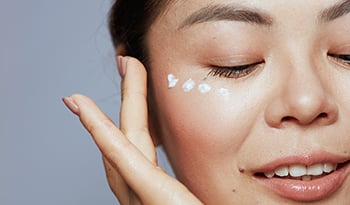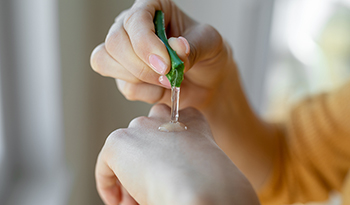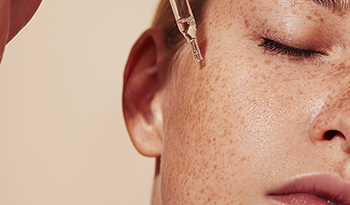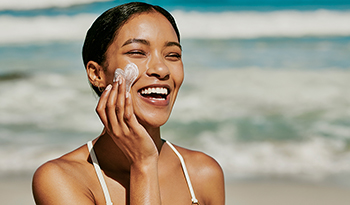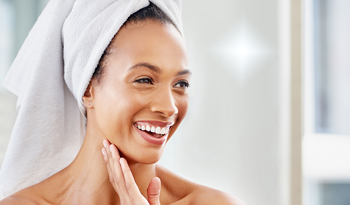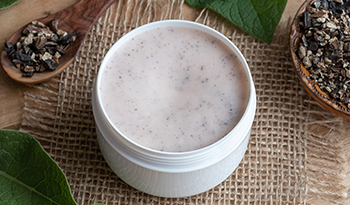재택 근무를 위한 스킨케어 조언(피부과 승인)

더 이상 완전한 봉쇄 모드는 아니지만, 많은 사람들이 여전히 재택근무를 하고, 식료품을 배달 받고, 대규모 사교 모임을 피하고 있습니다. 따라서 많은 사람들이 실내에서 더 많은 시간을 보내고 있습니다. 모든 것이 가상으로 전환되면서 스크린 사용 시간이 급증하고 있는 것 같습니다. 우리 모두는 이러한 환경과 활동의 변화로 인해 정신적, 육체적 영향을 느끼고 있을 텐데, 피부에도 어떤 영향을 미칠 수 있는지 생각해 보셨나요?
우리 피부는 온도, 습도, 공해, 빛의 차이로 인한 환경 변화에 민감합니다. 예를 들어, 겨울철에 건조해지는 등 계절에 따라 또는 여행 후 스킨케어에 필요한 것이 어떻게 달라지는지 경험해 보셨을 것입니다. 따라서 집에 더 자주 있는 것이 피부에도 변화를 가져올 수 있다는 것은 놀라운 일이 아닙니다.
이러한 최근의 라이프스타일 변화를 고려할 때, 실내에서 보내는 시간이 많아지면서 피부와 스킨케어에 가장 중요하게 고려해야 할 사항인 기분과 행동, 블루라이트(가시광선), 공기 수분 함량을 강조하고자 합니다.
행동 + 기분이 피부에 미치는 영향
솔직해지자. 많은 사람들이 잠옷 차림으로 전화 회의를 하고, 가상 강의를 듣고, 빵 굽는 법을 배우면서 하루를 보내고 있습니다(운이 좋게 이스트를 찾을 수 있었다면). 출근, 등교, 사교 모임 등 일상적인 일과를 준비하지 않으면 일상적인 스킨케어 루틴도 소홀해지기 쉽습니다. 제 생각에는 지금이 스킨케어 요법을 연마하는 데 집중하기에 가장 좋은 시기입니다.
힘들고 혼란스러운 시기에는 체계적인 스킨케어 루틴을 통해 안정감을 얻고 웰빙과 자기 관리에 집중하는 것이 도움이 될 수 있습니다. 또한, 사람들과 방해 요소로부터 멀어지기 때문에 장기적으로 도움이 될 수 있는 좋은 습관을 만드는 데 집중할 수 있는 시간이 더 많아집니다.
또 다른 고려 사항은 일부 스킨케어 제품(예: 국소 레티노이드)의 경우, 처음에는 피부가 발진하고 약간 나빠졌다가 좋아질 수 있다는 점입니다. 이 경우, 다른 사람들을 많이 만나지 않고도 몇 주 동안 신제품을 체험해 볼 수 있는 특별한 기회가 될 수 있습니다.
또 다른 중요한 요소는 분위기입니다. 많은 좌절과 불확실성, 친구나 다른 사람들과 떨어져 지내는 시간이 길어지면서 불안과 스트레스, 우울감을 느끼는 사람들이 늘고 있습니다. 우리의 정신 및 감정 상태가 육체와 연결되어 있다는 것은 잘 알려져 있으며, 피부의 세포는 뇌 및 신경과 같은 신경 조직과 동일한 배아 층에서 유래하기 때문에 피부는 마음과 독특한 관계를 맺고 있습니다. 그렇다면 이것은 무엇을 의미할까요? 즉, 정서적 스트레스가 높으면 여드름이나 주사비 발진, 건선, 습진 또는 기타 자가 면역 질환과 같은 피부 질환의 발작이 더 쉽게 발생할 수 있다는 뜻입니다.
여드름 발진에는 과산화벤조일 또는 살리실산이 함유된 제품을 찾는 것이 좋습니다. 하지만 여드름이 심하다면 피부과 전문의에게 진찰을 받아야 할 수도 있습니다. 일부 여드름은 처방약이 필요하며 흉터를 피하기 위해 조기에 치료하는 것이 좋습니다.
스트레스 완화를 위해 피버퓨, 카렌듈라, 라벤더, 카모마일이 함유된 제품은 모두 진정 효과를 줄 수 있습니다. 이러한 성분은 차, 오일, 보습제 및 기타 여러 제품에서 찾을 수 있습니다. 이러한 성분을 사용할 때 주의해야 할 점은 (다른 식물 유래 성분과 마찬가지로) 피부에 국소적으로 바르면 알레르기나 자극을 일으킬 수 있으며, 특히 민감한 피부를 가진 습진 환자에게는 더욱 주의해야 합니다.
블루라이트(가시광선) 대 피부
오늘날 대부분의 사람들은 태양의 자외선이 피부를 손상시키고 피부암과 피부 노화를 유발하는 가장 잘 알려진 원인 중 하나라는 사실을 알고 있습니다. 하지만 많은 사람이 깨닫지 못하는 것은 건물이나 스크린의 불빛과 같은 가시광선도 피부 노화와 색소 침착을 유발할 수 있다는 사실입니다.
뭐!? 실내에만 있어도 안전하다고 생각했지만, 집에 있는 동안에도 여전히 보호가 필요하다는 사실을 알려드리고자 합니다.
어렵습니다. 우리 몸은 항상 여러 출처에서 방출되는 다양한 파장의 전자파에 노출되어 있습니다. 전파, X-선, 자외선처럼 우리가 볼 수 없는 파장도 많습니다.
우리가 볼 수 있는 파장에서 방출되는 작은 범위의 전자기 복사가 있으며, 이를 "가시광선 스펙트럼"이라고 합니다. 이러한 파장은 태양에서도 방출됩니다. 그러나 자외선과 달리 가시광선은 집과 건물에 있는 형광등과 백열등, 컴퓨터 화면에서도 발생합니다. 과학자들과 연구자들은 가시광선, 특히 청색광 범위의 빛이 실제로 피부에 스트레스를 유발하여 색소 침착과 노화를 유발할 수 있다는 사실을 점점 더 많이 이해하고 있습니다.
따라서 실내에 있는 동안에도 여전히 보험이 필요합니다. 하지만 시중에서 판매되는 대부분의 자외선 차단제는 UVA/UVB 차단 기능만 제공하고 가시광선 차단 기능은 제공하지 않습니다. 그렇기 때문에 가시광선을 차단하는 데 가장 효과적인 산화철이 함유된 자외선 차단제를 선택하는 것이 중요합니다. 산화철은 종종 착색 자외선 차단제나 메이크업에 함유되어 있습니다.
틴티드 자외선 차단제를 사용하거나 가벼운 논코메도제닉 메이크업을 매일 사용하는 자외선 차단제 위에 덧발라 가시광선으로부터 추가 보호를 받을 수 있도록 하는 것이 좋습니다. 가시광선은 기미를 악화시킬 수 있으므로 기미 또는 피부에 갈색 반점/반점이 있는 사람에게는 특히 중요합니다.
가시광선으로 인한 손상을 막기 위해 활발히 연구되고 있는 또 다른 전략은 바르는 항산화제와 먹는 항산화제입니다. 가시광선으로 인한 산화 스트레스에 대항하는 것으로 입증된 항산화 성분으로는 피버퓨, 대두 추출물, 비타민 E를 결합한 자외선 차단제, 코코아 펩타이드, 경구용 폴리포디움 류코토모스 등이 있습니다.
공기 수분이 피부에 미치는 영향
실내 생활의 마지막 요소로 강조하고 싶은 것은 공기 습도입니다. 일반적으로 공기 중의 수분 수준은 외부보다 낮은 것으로 알려져 있습니다. 또한 실내에 있을 때는 히터나 에어컨을 사용하여 강제로 공기를 불어넣는 경우가 많습니다. 낮은 공기 습도는 피부가 수분을 유지하고 수분을 유지하는 데 영향을 미치는 것으로 입증되었기 때문에 겨울이나 팬데믹 기간처럼 실내에 머무는 시간이 많아지는 시기에는 피부가 더 건조하고 민감해지거나 습진이 악화되는 경향이 있을 수 있습니다.
이를 방지하는 몇 가지 방법이 있습니다. 하나는 집 안 공기의 수분 함량을 높이기 위해 가습기를 구입하는 것입니다. 또 다른 중요한 전략은 보습, 보습, 보습을 하는 것입니다.
몸에는 좋은 크림이나 연고 보습제를, 얼굴에는 순한 보습제를 사용하는 것이 중요합니다. 보습을 하기에 가장 좋은 시간은 샤워 직후이며, 저는 항상 사람들에게 보습제를 바르기 전에 피부를 두드려서 약간 물기가 있는 상태로 두라고 말합니다. 이렇게 하면 수분을 가두는 데 도움이 됩니다.
실내에 머무는 동안 피부 관리를 위한 이 팁이 도움이 되었기를 바랍니다. 소개해드린 방법을 통해 좋은 결과를 얻을 수 있길 바랍니다.
면책사항:웰니스 허브의 취지는 의학적인 진단이나 치료를 제공하는 것이 아닙니다.

















































































 목차
목차



